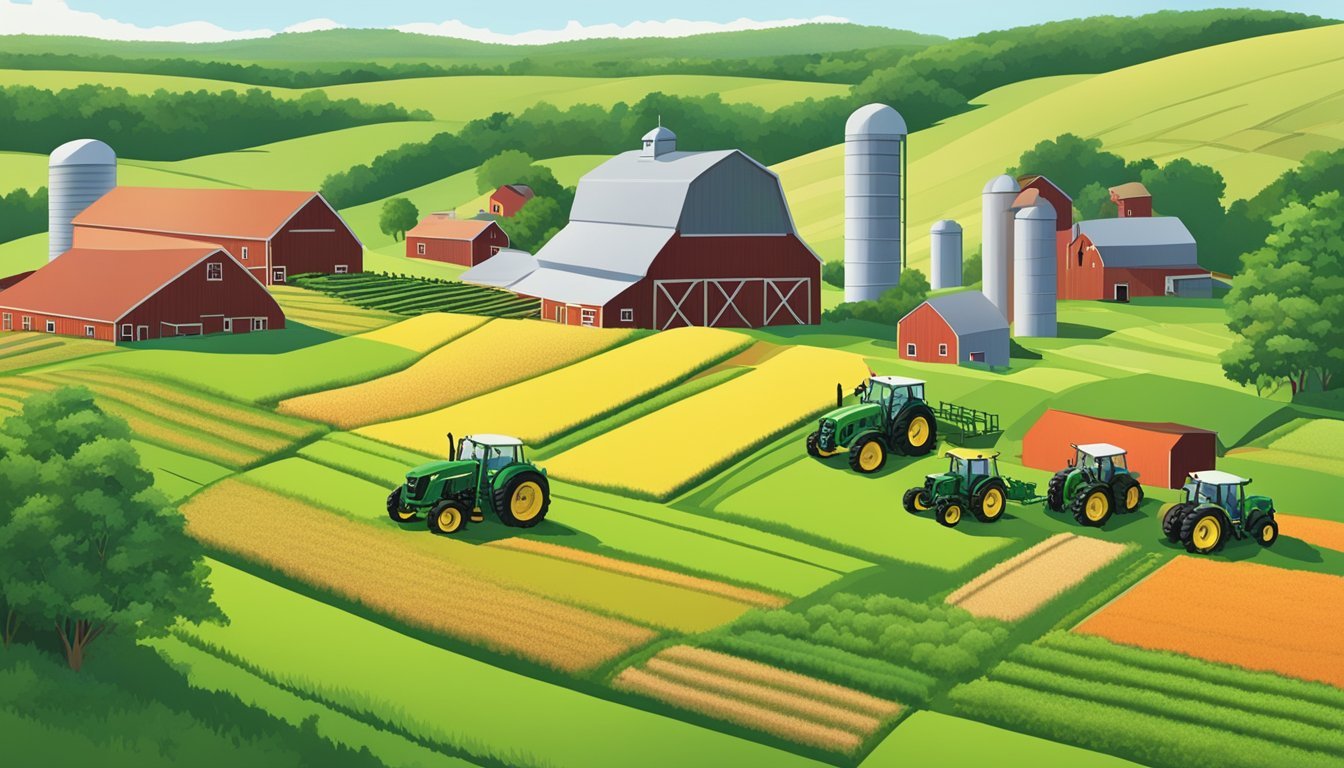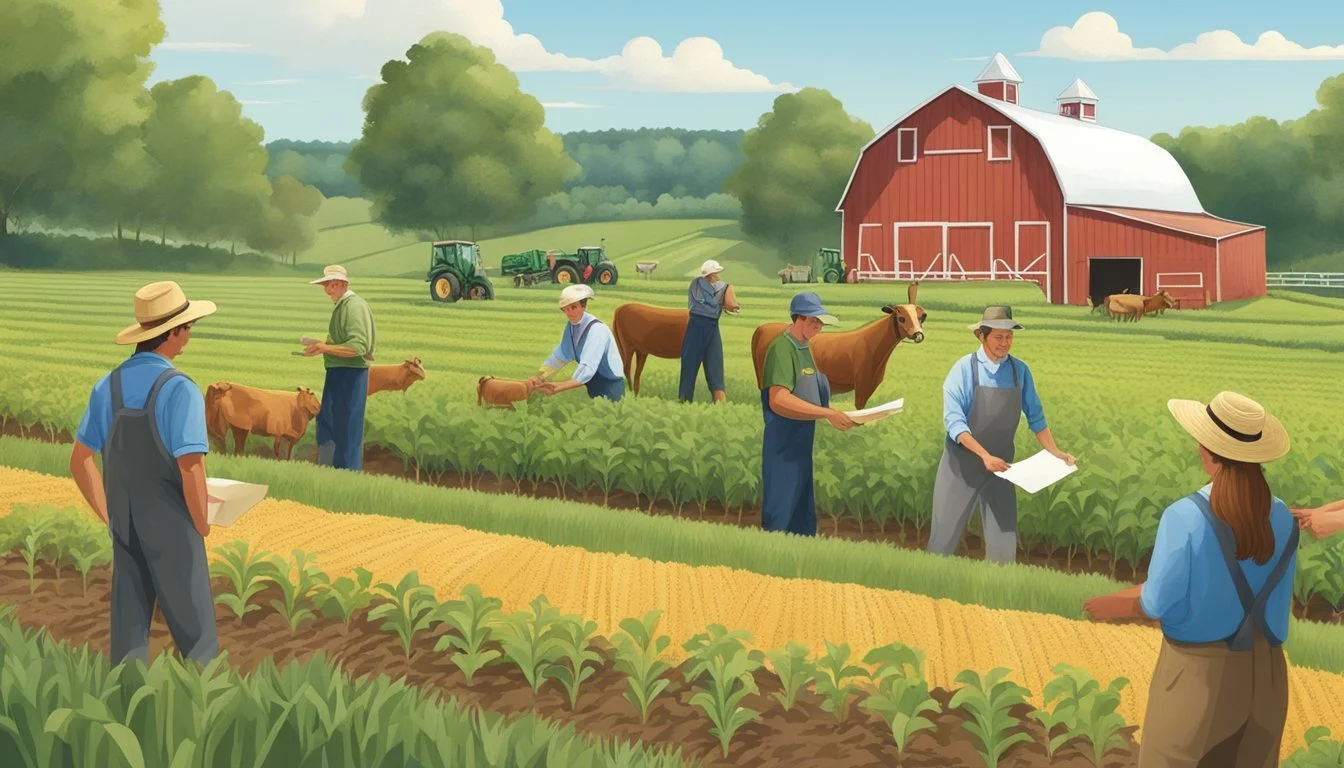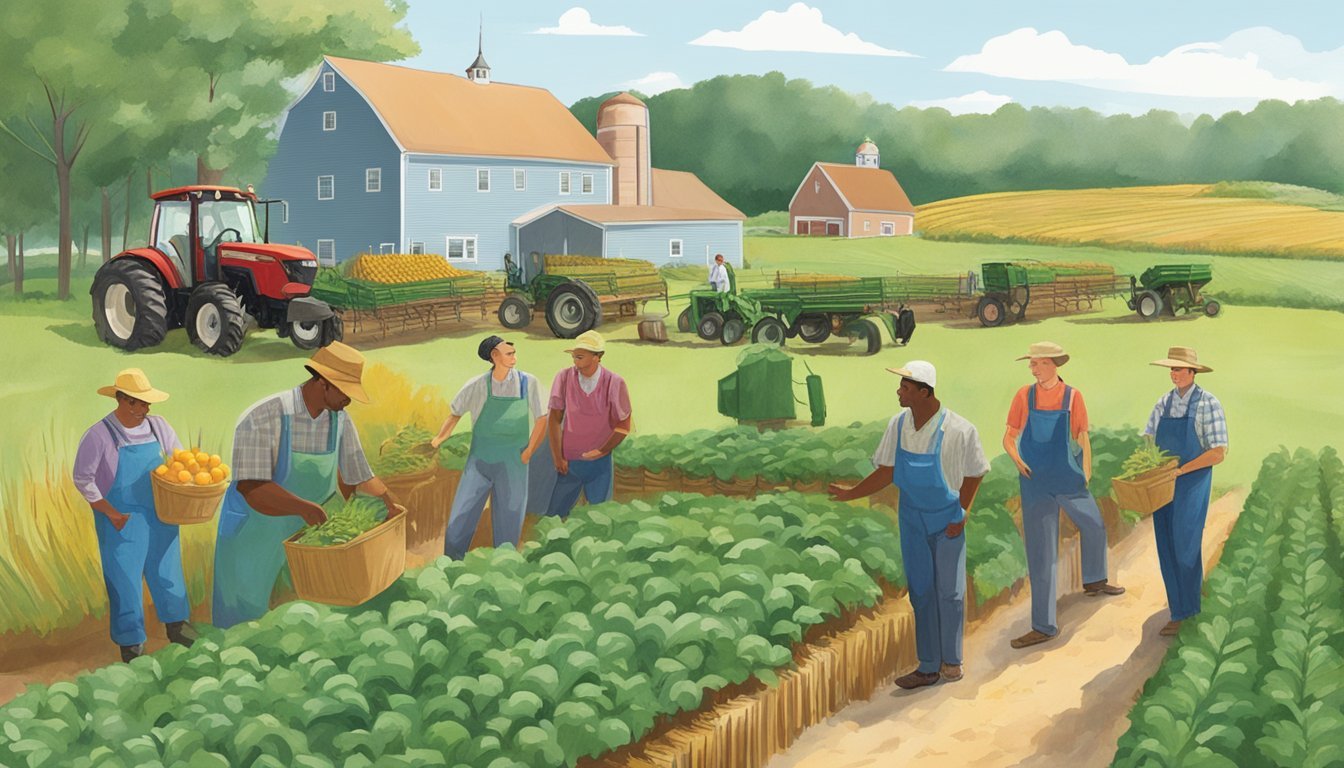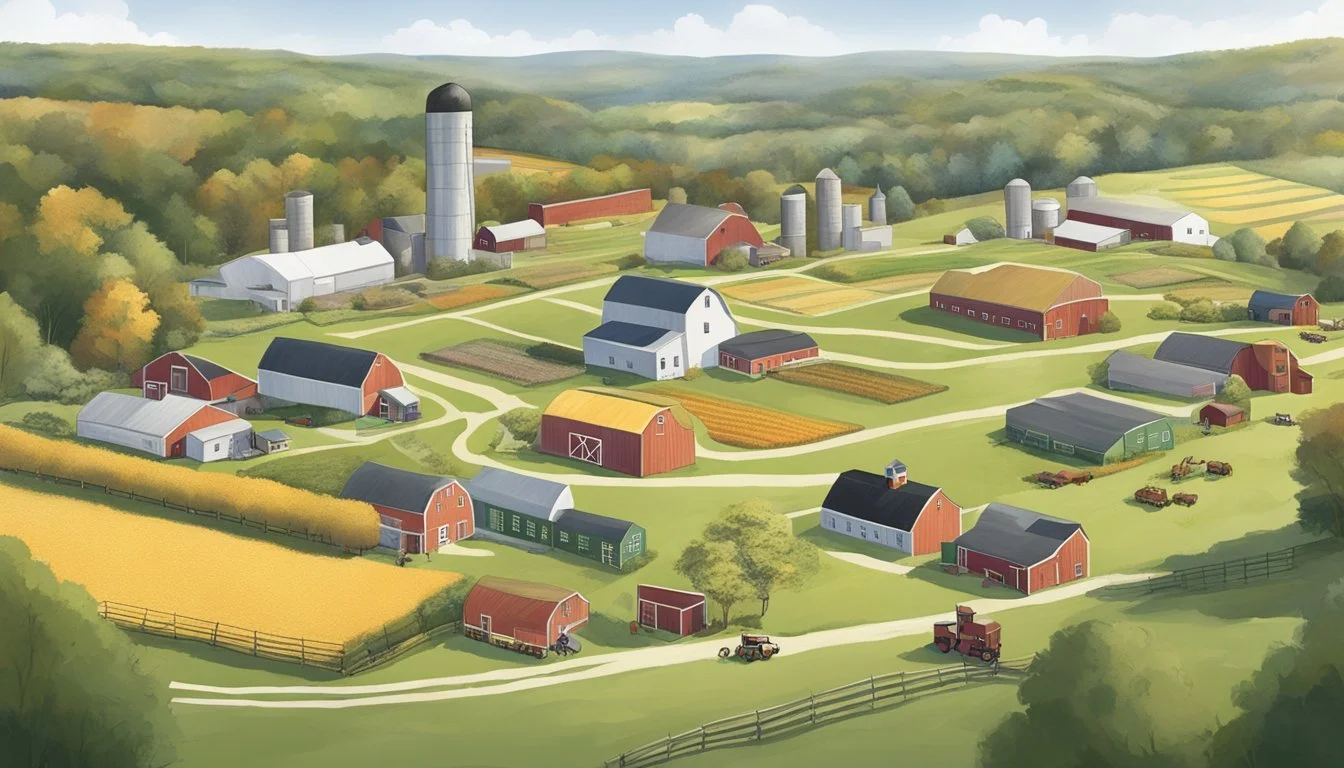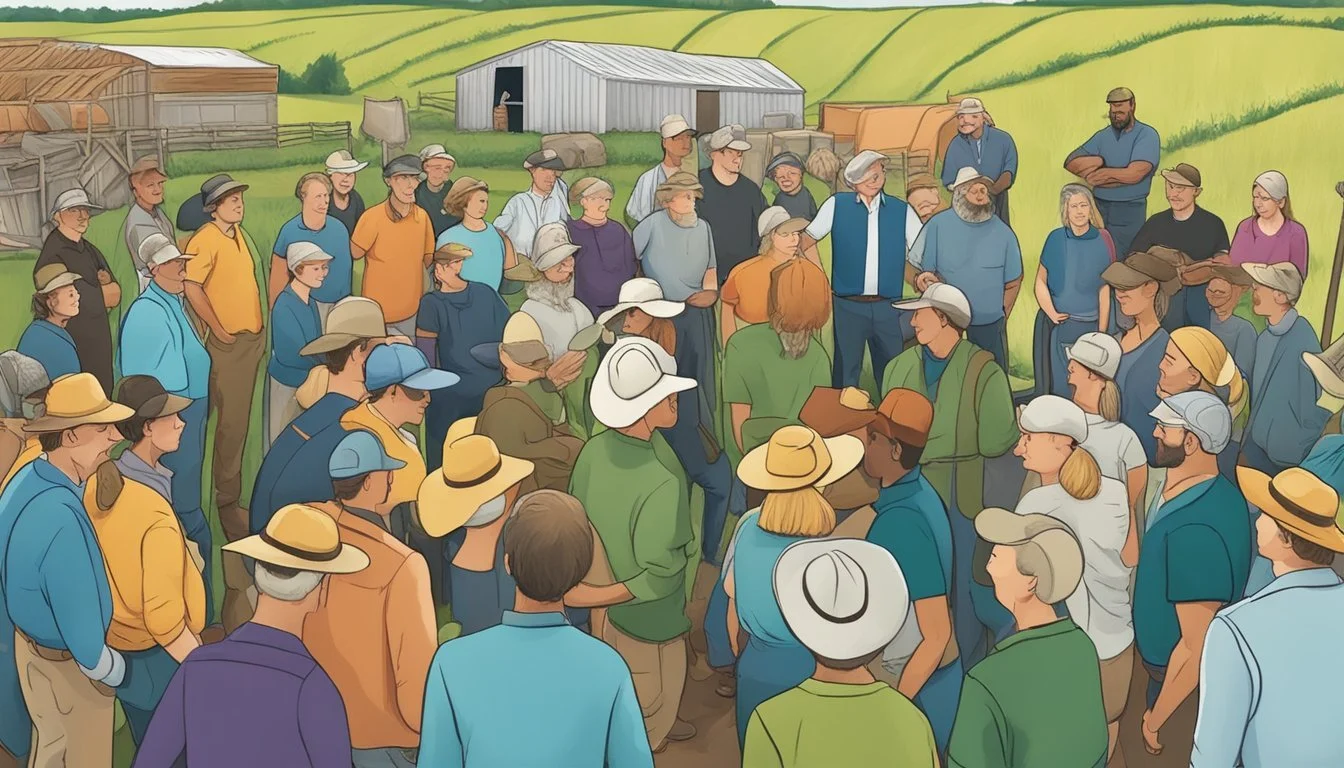Farming Grants Massachusetts
How to Secure Funding for Agriculture
Massachusetts supports its agricultural sector through various grants and financial assistance programs. These initiatives aim to bolster farm improvement, food access, marketing, and the sustainability of agricultural practices within the state. The Massachusetts Department of Agricultural Resources (MDAR) provides an assortment of grant opportunities for both new and established farmers. These include farm improvement grants, funding for new farms, and programs to enhance food access among communities.
The state is also mindful of the urban agriculture movement and offers support tailored for urban farmers with commercial experience. This support often takes the form of reimbursement grants that match the farmer's investment, thereby promoting the growth of urban farming initiatives. For those at the beginning stages of their farming careers, resources are available to help navigate the financial aspects of initiating agricultural operations, including grant programs that require a matched funding approach.
In addition to state-funded programs, the Massachusetts Farm Bureau makes scholarships and other agriculture-related financial aids accessible, with the aim of fostering the development of upcoming talent in the field. This educational support contributes to the long-term viability and innovation within the Massachusetts farming community.
Overview of Farming Grants in Massachusetts
In Massachusetts, farmers have access to various grant programs and financial assistance aimed at promoting sustainable agriculture and enhancing farm viability. These grants are designed to serve multiple purposes including land preservation, environmental stewardship, and business development.
The Division of Agricultural Conservation and Technical Assistance (DACTA) focuses on preserving agricultural land and providing technological and technical support to navigate 21st-century farming challenges. They emphasize environmental stewardship which is central to maintaining a sustainable agricultural sector in Massachusetts.
The Farm Viability Enhancement Program (FVEP) is another initiative through Mass.gov that provides business planning and grants to commercial farms. This program aims to bolster farm viability while ensuring the stewardship of agricultural resources. Farms can engage in one-on-one business planning and technical assistance in various areas.
For those looking to expand their agricultural operations, the Matching Enterprise Grants for Agriculture (MEGA) is particularly beneficial. This grant program, also overseen by Mass.gov, offers funds on a matching cost reimbursement basis, encouraging farmers to develop commercially viable operations.
Additionally, Massachusetts recognizes the need to support new and young farmers. Programs like MEGA have disbursed significant funds to a diverse array of farms, addressing the upward trend in the average age of farm operators and fostering new entrant opportunities.
Financial assistance options also include federal support through agencies like the United States Department of Agriculture (USDA). The USDA offers different programs tailored to support both the initiation and expansion of farming operations in Massachusetts, with grant requests commonly capped at $10,000.
Program Assistance Type Focus DACTA Technical, Technology Land Preservation, Stewardship FVEP Business Planning, Grants Farm Viability, Resource Stewardship MEGA Matching Funds Commercial Viability USDA Financial Support Beginning and Established Farms
It should be noted that eligibility requirements and application deadlines vary across programs, necessitating farmers to stay informed and proactive in seeking financial assistance.
Eligibility Requirements for Farmers
Eligibility criteria for agricultural grants in Massachusetts are tailored to support various types of farming operations. Farmers, whether experienced or beginning farmers, must navigate a range of requirements to qualify for financial assistance programs.
For general grant programs, farmers need to manage a minimum of five acres of active agricultural land. These lands should be under their care as part of a commercial operation for at least three years. Additionally, they must fulfill a specified gross income threshold from their farming activities.
Beginning farmers face distinct criteria designed to support their entry into agriculture. Programs such as "Exploring the Small Farm Dream" are structured to provide them with the knowledge necessary to evaluate the feasibility of their proposed agricultural business.
Regarding commercially viable operations, emphasis is placed on financial risk management through diversification, marketing strategies, or natural resource conservation. The focus extends to sectors like dairy, livestock, and cultivation of traditional agricultural products.
The Urban Agriculture Program caters specifically to farming activities within urban settings, acknowledging the unique challenges and opportunities present in such environments.
For operations focused on certified organic products, Massachusetts provides tailored assistance geared towards supporting organic practices and covering relevant certification costs.
Entity Criteria General Farmers 5+ acres, 3-year management, income threshold Beginning Farmers Specialized training, business feasibility assessment Commercial Operations Risk management, diversification, marketing, conservation Urban Agriculture Urban setting-specific support Certified Organic Support for organic practices, certification costs assistance
Farmers interested in these programs must adhere to the deadlines and application guidelines set forth by the respective departments managing the grants.
Types of Farming Grants Available
Massachusetts offers a variety of grants aimed at supporting the local agricultural community by providing financial assistance for equipment, infrastructure, energy efficiency, environmental conservation, and land acquisition.
Matching Enterprise Grants for Agriculture Program (MEGA)
The Matching Enterprise Grants for Agriculture Program (MEGA) provides funding to help new farmers start or improve their business. Grant recipients must provide a matching contribution, and funds can be used for a range of purposes including purchasing equipment and infrastructure to enhance productivity.
Agricultural Food Safety Improvement Program (AFSIP)
The Agricultural Food Safety Improvement Program (AFSIP) offers grants to Massachusetts farmers to improve food safety. The grants can be used to implement new safety measures and to cover costs for equipment that ensures crops adhere to safety standards.
Climate Smart Agriculture Program (CSAP)
Through the Climate Smart Agriculture Program (CSAP), farmers can receive grants to implement practices that improve climate resilience. Funding supports projects that focus on energy efficiency and environmental conservation, helping farmers adapt to changing climatic conditions.
Agriculture Preservation Restriction (APR) Program
The Agriculture Preservation Restriction (APR) Program is designed to promote land acquisition for agricultural use. It works by acquiring development rights to farmland, thereby ensuring the land remains available for farming in the future.
Farm Viability Enhancement Program
Lastly, the Farm Viability Enhancement Program aids established farmers in Massachusetts. This program offers grant funds used to develop business plans and strategies, with the goal of enhancing the long-term viability of their farms. Grants from this program might be invested in essential infrastructure upgrades or expansions.
Application Process for Grants
When applying for agricultural grants in Massachusetts, the Department of Agricultural Resources provides necessary guidelines and resources to ensure a structured application process. Interested applicants must adhere to specific application periods, which are typically announced well in advance.
Key Steps in the Application Process:
Planning: Initial planning is crucial. Applicants should prepare by understanding the scope of their agricultural project, the required budget, and the potential benefits to their operation.
Request for Responses (RFR): Grant opportunities are listed under RFRs on Mass.gov. Each RFR contains information about eligibility, funding available, and submission deadlines.
Technical and Business Planning Assistance: For those seeking additional help, Massachusetts offers technical and business planning assistance to fortify their applications and enhance the chances of approval.
Application Periods and Deadlines:
Start by checking opening and closing dates on Mass.gov. Some grants have short windows for application, while others may offer multiple periods throughout the year.
Necessary Documentation:
Applicants must gather all required documentation, often including project proposals, budget justifications, and evidence of agricultural practice or potential.
Submission Process:
Submission is typically conducted online via the Mass.gov portal. Applicants should ensure all materials are submitted by the specified deadline to be considered.
Applicants are encouraged to review all grant details thoroughly before submission. The Department of Agricultural Resources may also hold informational sessions for certain grants, which can be invaluable in the planning process. Ensuring completeness and compliance with the grant requirements is vital for a successful application.
Grant Funding and Usage
Farm businesses in Massachusetts can access a variety of grant funds designed to support capital improvements, land acquisition, marketing efforts, and research initiatives. Funds, such as those from the Massachusetts Department of Agricultural Resources (MDAR), often aim to enhance the agricultural landscape by providing financial assistance for improvement projects.
Grants, like the Agricultural Energy Grant Program (ENER), focus on energy efficiency and the adoption of renewable energy solutions on farms, which can lead to long-term operational savings. Similarly, the Agricultural Preservation Restriction (APR) Program aids in land conservation efforts, thus safeguarding agricultural spaces for future generations.
Grant Utilization:
Capital Improvements: Funding may be used for the development of farm infrastructure, such as building greenhouses or installing irrigation systems.
Land: Grants support the purchase of agricultural land or the conservation of existing farmland.
Marketing: Programs may offer resources for farmers to enhance their product marketing, increasing profitability and market reach.
Research: Financial support often extends to agricultural research, promoting innovative and sustainable farming practices.
Eligibility may vary, as seen with the FAST grants, which are limited to farmers in specific counties. Moreover, programs like the Beginning Farmer Resources offer reimbursement grants up to $50,000, incentivizing new farmers towards organic farming and other sustainable practices.
Important Programs:
APR Program: Land conservation and preservation
ENER Program: Energy projects for efficiency and renewable adoption
SEMAP: FAST grant eligibility focused on geographical location
Farmers are encouraged to leverage these opportunities to elevate their agricultural endeavors, contributing to the robust agricultural sector of Massachusetts.
Additional Financial Assistance and Resources
Massachusetts farmers have access to a myriad of resources aimed at bolstering farm viability and sustainability. These include loans, business planning aid, and technical assistance to ensure long-term success and growth.
Loans and Financial Programs
Financial Assistance Programs offer crucial support through grants and funds for various agricultural projects. Entities such as MDAR (Massachusetts Department of Agricultural Resources) and USDA (United States Department of Agriculture) provide financial backing for eligible farmers.
Grants: Offered for a variety of agricultural projects to support farm operations.
Loans: Tailored to help farmers manage the costs of running a farm, with programs catering to new and distressed borrowers.
Business Planning and Market Access Aid
Business Planning Assistance helps farmers to develop a robust business strategy, ensuring farm viability and market competitiveness. Programs like the Farm Viability Enhancement Program (FVEP) are instrumental, providing:
Business planning support: Craft detailed business plans for strategic growth.
Market access support: Gain better access to markets, improving sales and profitability.
Technical Assistance for Farmers
Technical Assistance encompasses mentorship, educational resources, and training programs, designed to enhance farmers' knowledge and skills.
Mentorship: Experienced individuals guide less seasoned farmers.
Educational Resources and Training Programs: Assist farmers in adopting new techniques and practices for better farm management.
Conservation Practices: Encourage sustainable stewardship of agricultural resources, ensuring environmental compliance and enhancement of natural habitats.
Farming Education and Training Opportunities
Massachusetts offers a multitude of education and training opportunities for those interested in agriculture. These programs cater to a diverse audience, from new farmers to seasoned professionals, and cover various aspects of agricultural education.
New Entry Sustainable Farming Project provides comprehensive training for new farmers. This initiative focuses on practical, hands-on experience coupled with mentorship to guide new entrants into sustainable farming practices.
For educators looking to integrate agriculture into their curriculum, the Massachusetts Department of Agricultural Resources endorses the 'Massachusetts Grown...and Fresher!' program, which contains educational resources aimed at promoting agriculture education within schools.
Highlights of Available Training Programs and Resources
Agricultural Grants: For projects involving classroom instruction, laboratory research, and hands-on learning.
Mentorship: Programs often include experienced guidance from established farmers.
Beginning Farmer Resources: Offers financial aid, such as reimbursement grants, and support for land acquisitions.
Community Involved in Sustaining Agriculture (CISA) plays a pivotal role by providing resources and support for local agriculture, emphasizing the mentorship aspect and equipping farmers with community-based educational backing.
The state embraces the Farm to School Initiative, providing schools with grants to establish or expand agricultural education programs. These initiatives ensure K-12 to early education students gain exposure to farming activities and understand the importance of agriculture in their local community.
In summary, Massachusetts provides diverse educational pathways for those in farming through strong support programs, mentorship, and financial assistance, ensuring the growth and sustainability of its agricultural community.
Farming Infrastructure and Land Management
In Massachusetts, agriculture relies heavily on available resources and responsible land stewardship. Grants and financial assistance programs are fundamental to enhancing farm infrastructure, promoting sustainable land management, and ensuring energy-efficient practices.
Land Conservation and Acquisition
Land Conservation initiatives focus on the preservation of agricultural lands through programs such as the Agricultural Preservation Restriction (APR) program, which offers funding for permanent deed restrictions to keep farmland from being developed for non-agricultural uses. Grants also facilitate land acquisition for farmers, where entities like Land for Good and Equity Trust play a significant role in providing resources and guidance on how to access land.
Land Conservation Efforts:
Permanent Deed Restriction: Utilizes grants to maintain agricultural land use indefinitely.
Land Acquisition Assistance: Provides financial support for purchasing farmland.
Infrastructure Development and Improvement
Infrastructure Development is central to the 21st-century farming challenges in Massachusetts. It encompasses improving existing farm structures, incorporating modern technologies, and addressing infrastructure needs. State-run programs may offer reimbursement grants of up to $50,000 to aid in such development, ensuring equity in access to funding and support in the acquisition of essential infrastructure.
Infrastructure Improvement Projects:
Reimbursement Grants: Up to $50,000 available with conditions applied for improvements.
Technical Assistance: Offered to ensure optimal use of funds and development of infrastructure.
Resource Conservation and Energy Efficiency
The focus on Resource Conservation and Energy Efficiency is paramount to combining environmental sustainability with operational viability. Financial assistance, covering up to 75 percent of the installation costs for conservation practices, helps farmers adopt measures that contribute to soil health, water conservation, and energy savings. Programs like the Agricultural Management Assistance (AMA) initiative work towards enhancing farm infrastructure with a cap of $50,000 on total payments per participant per fiscal year.
Conservation and Energy Programs:
Conservation Practices: Financial assistance for practices improving resource use.
Energy Efficiency: Grants and cost-sharing programs to reduce energy consumption and promote sustainability.
Sustainability and Environmental Programs
In Massachusetts, the emphasis on sustainable and environmentally friendly farming practices is evident through various grant programs. The Climate Smart Agriculture Program (MA-CSAP) integrates multiple grants to support agricultural resilience to climate change. This program benefits farmers who implement energy efficiency improvements and renewable energy projects aligning with the Massachusetts Clean Energy and Climate Plan goals for 2030 and 2050.
Another significant initiative is the Agricultural Composting Improvement Program (ACIP), which encourages farmers to enhance waste management through composting, aligning with resource conservation practices.
Here's a snapshot of efforts in sustainable farming programs:
Climate Smart Agriculture Program: A unified application process for grants fostering energy efficiency and renewable energy.
Agricultural Composting Improvement Program: Supports composting efforts as part of sustainable waste management.
Massachusetts links environmental conservation directly with regulatory requirements, ensuring that farming practices contribute to combating climate change and preserving resources.
The state's dedication to these initiatives reflects a comprehensive approach to sustainable farming—one that merges economic support with environmental stewardship. Farmers are encouraged to adopt practices that not only meet current regulatory standards but also pave the way for a more sustainable and resilient agricultural future.
Marketing and Sales Support for Agricultural Products
Massachusetts provides diverse support mechanisms to help farmers and agricultural businesses enhance the marketing and sales of their products. One key initiative is the Massachusetts Food Ventures Program, which aims to bolster local food ventures and increase market access for local products.
Farmers and food producers can take advantage of marketing and promotion grants designed to increase visibility and consumer awareness. These grants support a variety of promotional activities essential for expanding the customer base and driving sales.
Additionally, the state encourages growth in local food sales through the Buy Local non-profit organizations. These entities play a significant role in fostering consumer purchasing of locally grown or produced products. They have established networks to assist producers in engaging with local markets effectively.
Farmers’ markets in Massachusetts serve as critical venues for direct sales, allowing producers to connect directly with consumers. They not only operate as retail hubs but also act as interactive spaces for marketing and consumer education about the benefits of locally sourced products.
To enhance market access, producers may utilize programs that provide guidance and financial support to adopt better marketing strategies. This comprehensive approach ensures that Massachusetts agricultural products maintain a strong presence in the marketplace and reach consumers through various channels.
In summary, Massachusetts offers marketing and sales support through various programs and initiatives that assist agricultural producers in increasing the visibility and consumption of their products within the state and beyond.
Specialized Programs for Unique Farming Operations
Massachusetts offers a variety of grants tailored to support specific types of farming. These specialized programs aim to empower urban farmers, assist dairy operations, and promote organic certification with appropriate financial assistance.
Urban Agriculture Program
The Urban Agriculture Program endorses farming in urban areas, recognizing the unique challenges faced by urban farmers. It offers both technical and financial support to help them establish and expand their agricultural operations within city environments. Participants receive assistance not only in financial terms but also in navigating urban-specific zoning and land use regulations.
Dairy Farming Specific Grants
Dairy farmers in Massachusetts can benefit from grants specifically designed to support dairy operations. These targeted funds aid dairy farmers in maintaining the sustainability and economic viability of their farms. Through these financial incentives, dairy operations can invest in modern equipment, adopt innovative practices, and improve overall efficiency to remain competitive in the market.
Organic Farming and Certification
For farmers pursuing certified organic status, Massachusetts facilitates the transition with grants that can be applied towards the costs associated with obtaining organic certification. These funds aim to help farmers cover expenses such as soil amendments, organic seeds, and required education on organic farming practices. The goal is to help commercially viable operations not only achieve certification but also implement organic farming methods that are environmentally sustainable and economically beneficial.
Networking and Community Support
In the realm of Massachusetts agriculture, community support and networking are crucial elements that facilitate the growth and sustainability of local farms. Entities like Berkshire Grown play a pivotal role by serving as a nexus for farmers and food buyers. Through a range of programs and workshops, this organization strengthens the local food system and fosters community access to local produce.
Programs & Workshops: Networking events, educational series, and financial support sessions.
Community Access: Initiatives to enhance local food procurement and consumption.
The Cambridge Food and Fitness Council is another example, focusing on capacity-building within the Cambridge local food system. This council plays a part in strategic planning that involves key community stakeholders, such as the Cambridge Food Pantry Network and SNAP Match Coalition, supporting the markets and farmers therein.
Capacity Building: Strategic planning and supporting local food ecosystem.
SNAP Match Coalition: Promotes access to local produce for SNAP recipients.
For new entrants in agriculture, the Massachusetts Department of Agricultural Resources (MDAR) offers mentorship opportunities and grants which can be vital for those navigating the early stages of their farming journey or realizing their small farm dream. These resources are designed not only to provide financial assistance but also to offer guidance and connect aspiring farmers with more experienced mentors.
Mentorship: Experienced farmers guide beginners.
Grants: Financial aid for various agricultural projects.
Finding land, an often daunting task for emerging farmers, is addressed through resources like Mass.gov’s Beginning Farmer Resources, offering reimbursement grants that facilitate land acquisition, thereby ensuring new farmers have a solid foundation to start their operations.
Land Acquisition:

